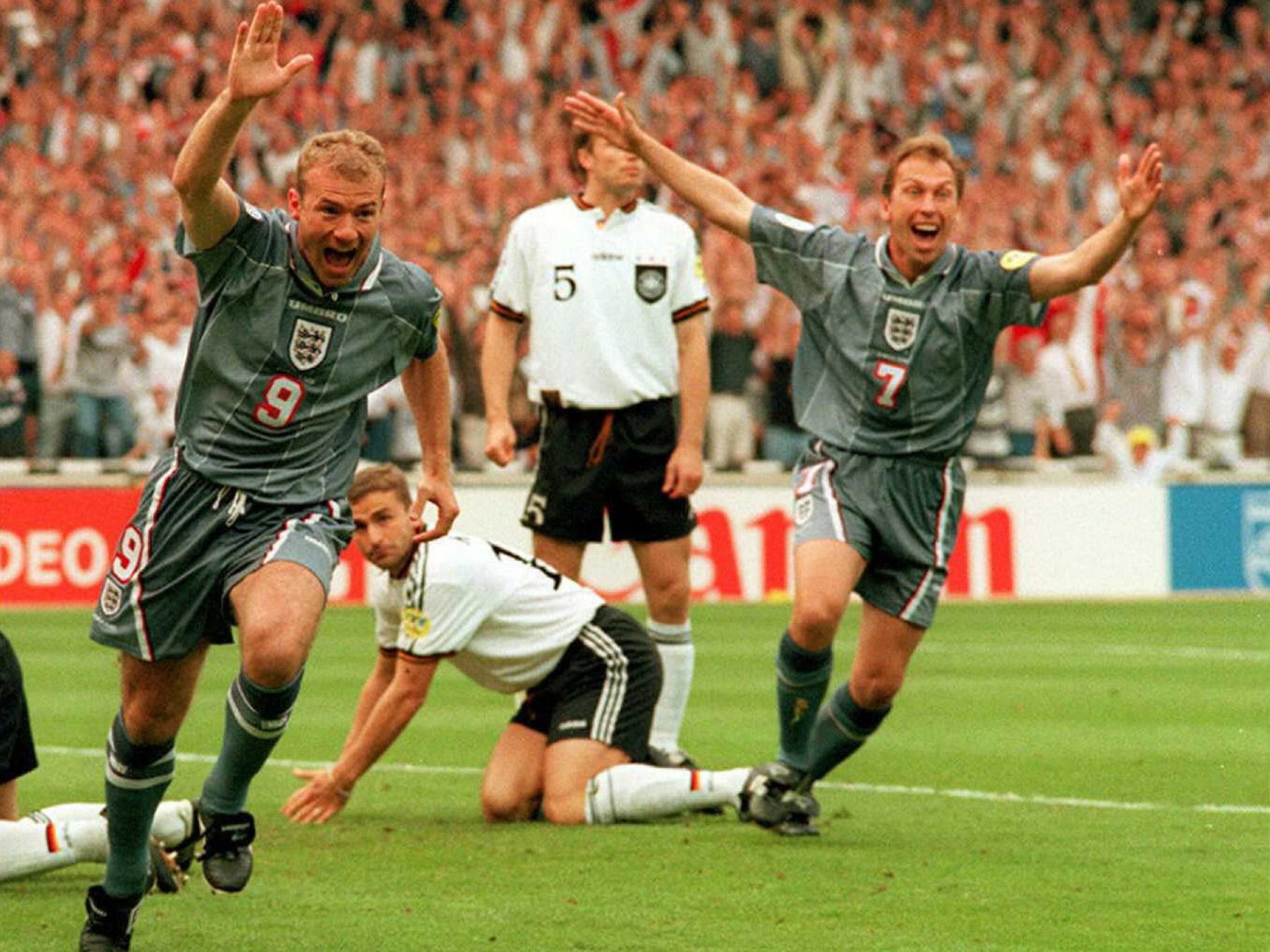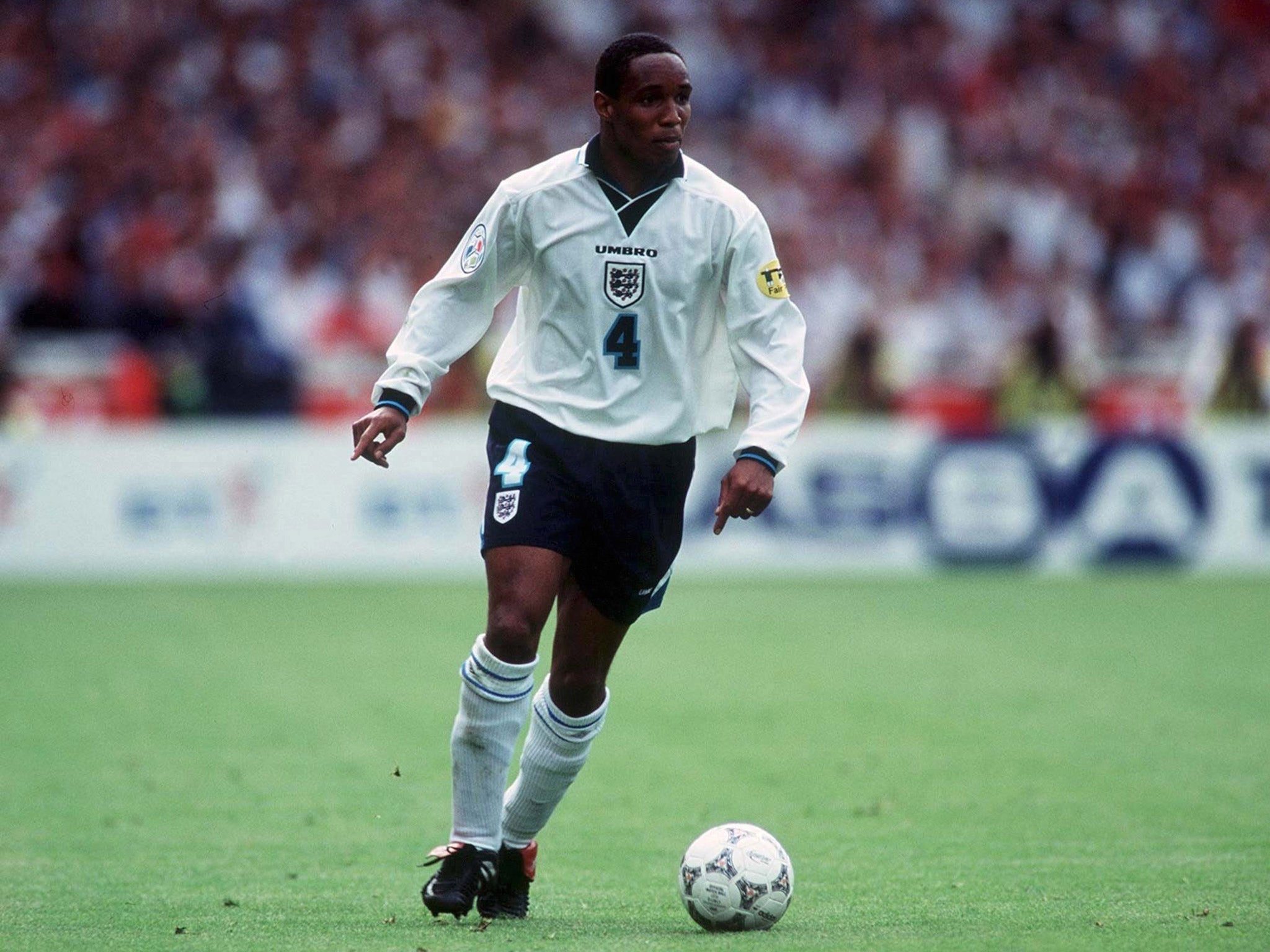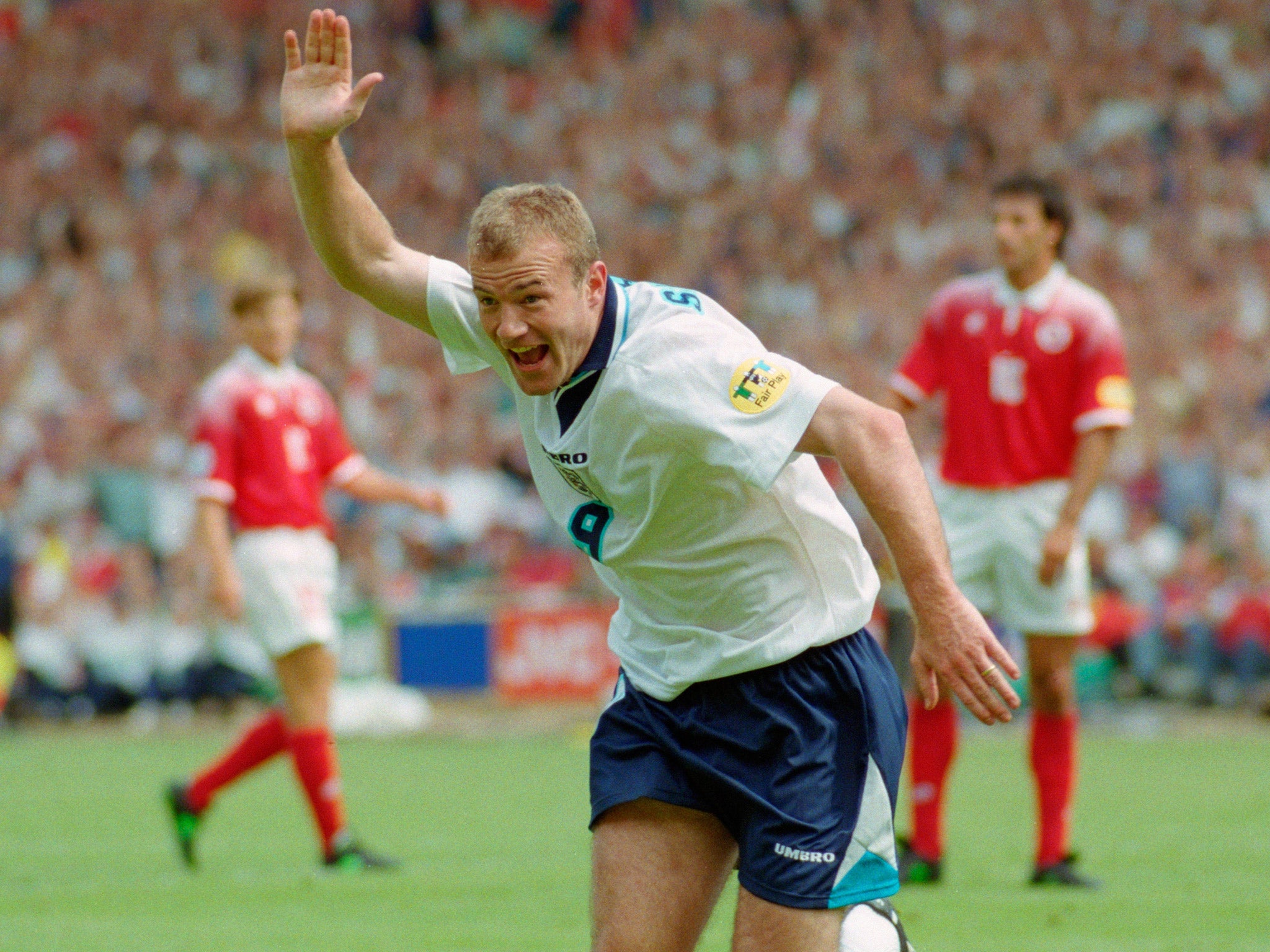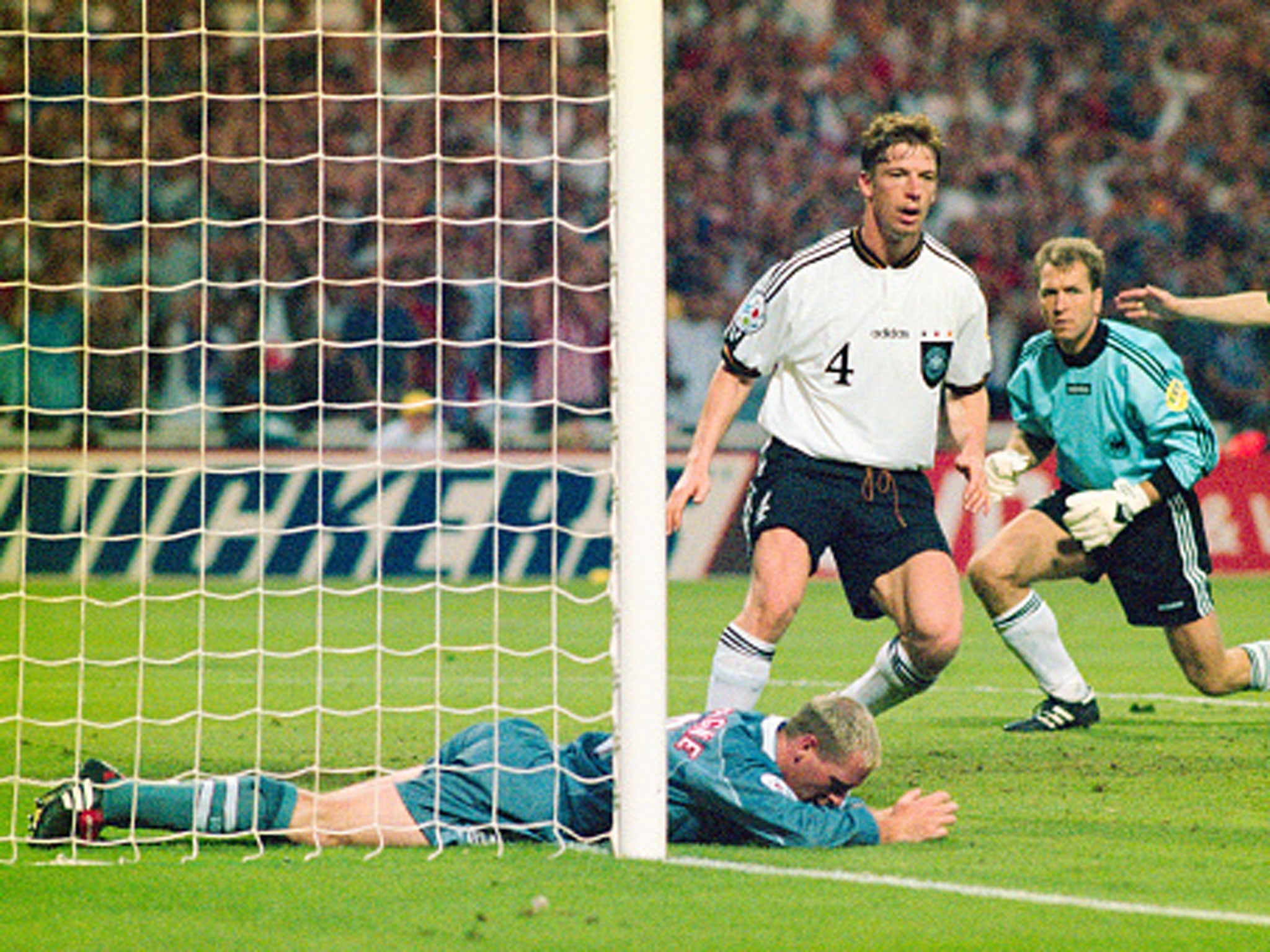Twenty years of hurt: Three Lions remember England's thrilling Euro 96 campaign
Gazza's studs, golden goals and Football's Coming Home. 1996 was the summer when Terry Venables' side were so close to glory, as members of the team tell Matt Gatward

Your support helps us to tell the story
From reproductive rights to climate change to Big Tech, The Independent is on the ground when the story is developing. Whether it's investigating the financials of Elon Musk's pro-Trump PAC or producing our latest documentary, 'The A Word', which shines a light on the American women fighting for reproductive rights, we know how important it is to parse out the facts from the messaging.
At such a critical moment in US history, we need reporters on the ground. Your donation allows us to keep sending journalists to speak to both sides of the story.
The Independent is trusted by Americans across the entire political spectrum. And unlike many other quality news outlets, we choose not to lock Americans out of our reporting and analysis with paywalls. We believe quality journalism should be available to everyone, paid for by those who can afford it.
Your support makes all the difference.There’s one thing that everyone involved in the England team of Euro 96 agrees on: had they beaten Germany in that amazing, thrilling, high-octane, drama-filled, Gazza-not-quite-tall-enough semi-final, they would have won the trophy. Thirty years of hurt at an end. Instead, the pain has been prolonged for 20 years.
Twenty years. It makes you feel old. “Wow! 20 years. Unbelievable. Makes me feel old too - don't worry about that,” Paul Ince tells The Independent. “It doesn't feel 20 years ago. But, yes, it’s one we missed. We had a great opportunity. We’d have won the final without a doubt, definitely.”
Alan Shearer, top scorer at the tournament, agrees. “We gave everything,” he tells me at a BBC Euro 2016 launch. “Just thinking of Gazza’s stud missing the ball, penalties and everything else…It was a tournament that we’d have won if we’d got through that semi-final. I’m pretty sure about that.”
“A toe length of Gazza’s,” writes Tony Adams in his brilliant autobiography, Addicted. “Or a better finish by Darren Anderton, who hit the post and we’d have been in the final against the Czech Republic. And we’d have won that. No danger.”
We will never know, of course, but one thing is inarguable: it was a glorious summer of football that caught the nation’s imagination. It was the first tournament the country had hosted since the 1966 World Cup, hooliganism seemed to be a thing of the past, and the games were the only talk in town for one sun-filled month. Pubs were packed, flags were waving, Baddiel and Skinner were singing and fans were dreaming.
“It was amazing,” Shearer says. “Amazing. I haven’t watched the games back for a while but I did for a bit. Great memories. We gave our all and when that happens you can’t ask for more. It was a fantastic summer. We got off to a slow start but the momentum grew, like a snowball effect. Once you get on a roll…We were very difficult to stop. And it’s great, you play with confidence, playing in a great stadium, the backing. You're at home. You can feel it, you can feel the momentum pulling you along.”
I’d heard Shearer say he used to think about Euro 96 10 times a day but now it’s down to once. Is that true? “Yeah, absolutely,” he says. “But there’s no regret. We gave our all. We couldn't have done anything different so there’s no regrets, just what-ifs…”
“Everything about the tournament brings back memories,” adds Ince, “from Hong Kong [and the pre-tournament tour] to the hot summer days, to that great game against Holland, all those memories come flooding back, both good and bad. The misses by Anderton and Gazza, Southgate. The fans standing on the streets, hanging out of windows, pubs, flags…”

The soundtrack to the summer was, of course, Three Lions written by comedians David Baddiel and Frank Skinner with Ian Broudie of the Lightning Seeds and which Gazza used to play at every opportunity around the team hotel during the tournament. “It still makes the hairs on the back of my neck stand up,” admits Shearer. “I’m doing a documentary for the BBC and I've just spoken to Baddiel and Skinner. They were great and listening to the song again, yeah, that was the song of 96. We played it all the time.”
“Yeah, it is an iconic song,” agrees Ince. “I’ve not heard it for a while but every four years it pops up. All the stuff that song brings, it never leaves you. As much as it was disappointing not to win it, I have some great, great memories from it.”
In the build-up to the tournament, it was hard to imagine that Terry Venables’ side would be the length of a Paul Gascoigne stud from glory. There was a furore caused by the squad’s drinking antics on a pre-tournament trip to Hong Kong which the newspapers seized on. But it brought the squad closer together, they became deeper entrenched in their Burnham Beeches hotel.
Everything about the tournament brings back memories, good and bad. The hot summer days, that great game against Holland, the misses by Anderton and Gazza, Southgate. The fans on the streets, hanging out of windows, pubs, flags...
“When I think about going to Hong Kong,” Ince says, “the stick we got when we came back from the press and probably rightly so but, if anything, it brought us closer together as a team.”
“It felt good inside the squad,” Adams says. “By using adversity to our advantage, we grew stronger. After everything it was a relief to get to the first game against Switzerland. The hype had been amazing with all the ‘Football’s Coming Home’ feel-good stuff but we had to get our heads into football.”
England began the tournament with Shearer under pressure for goals and the unheralded Swiss as their first opponents. The fans demanded victory, surely the players did too? Not so. “Not to lose is the aim of the opening match,” Adams writes of the 1-1 draw in which Shearer, who will be a BBC pundit during the Euros, scored to get the monkey of no goals in 12 matches off his back.
Ince agrees: “In any tournament, it is important to get something out of the first game. What you can’t do is lose, then it becomes tough and you have to win the next two. It was a good point. We had something to build on. It was hard because everyone was talking about the Scotland game because they thought Switzerland was a foregone conclusion. It wasn’t.
“Scotland was a very passionate game,” adds Ince. “It could have gone either way, but Gary McAllister misses that penalty. Winning that game lifted the whole nation. That is where we started to build that momentum: Gazza scoring and the celebration, that was the start of it. To get the win was fantastic.

“When we played in France 98 we weren’t aware what was going on back home but when you're at home every time you go training you see fans outside the hotel or cars with flags on them, people cheering and wishing you all the best. And the further we went in the tournament the more we saw it - hanging out of windows, outside pubs. To know you’ve got the whole nation behind you was a great, great feeling.”
Adams agrees: “Scotland was the turning point,” he writes. “When Shearer headed home Gary Neville’s cross we knew we were as good as in the quarter-finals. I was sickened to concede a penalty. When David Seaman saved McAllister’s kick, though, I rushed to [give him a] kiss. Gazza was really up for it that day. His goal, the lob over Colin Hendry then the volley past Andy Goram, was outstanding.”
But before the quarters came Holland and one of England’s greatest ever performances. The squad had a 90-minute meeting the day before the game where Venables, who had tinkered with formations and personnel in the build-up to the tournament to cover all eventualities, detailed individual roles for players, strengths and weaknesses of the Dutch and an overall gameplan. It worked a treat, England won 4-1 and Venables would later describe the tournament as his finest hour.
“In the Holland game we were outstanding as a team,” Ince says. “It was the best performance in many, many years. It was one of those where everything just clicked. Everyone was 10 out of 10. Every time we had a shot it looked like we’d score. It was a great game. It could have been more.
“I was a bit annoyed because I got taken off 25 minutes from the end. I got booked and I was suspended for Spain. When you are playing free-flowing football you want to be part of it. At 4-1 up, I'm thinking I'm going to score now - then I got dragged off. I was absolutely fuming. And Terry knew it and all!”
“There was no way were going to lose to them. We annihilated them,” Adams adds, “with one of the best England performances I have been party to. One of our great nights.”
Progress to the quarter-finals was assured but the opposition were arguably the best team in the tournament. England held out for a 0-0 and a penalty shootout, the Spanish having a marginal offside decision go against them. “Watching the Spain game was tough,” says Ince. “They were a top team and if we don’t get through I've played my last game. So I’m praying that we win. They should have beaten us so I was pleased that we managed to take it to penalties and then when Stuart Pearce scored… There were moments in the tournament that lifted us and made us think we could go further - that was one. It gave us another wave of momentum.
“In the changing room there was a realisation that this could be our tournament, our time, but we couldn't get too clever. El Tel was good at keeping us calm.”
But there were not many calm people inside Wembley or out when after extra time against the Germans, England, in those grey kits having been drawn as the away team, were heading for another penalty shootout. They had taken an early lead through Shearer but conceded an equaliser just 13 minutes later. The match ebbed and flowed until in golden goal extra time Anderton hit the post and the beach-blond Gazza broke his running stride and failed to convert Shearer’s cross by the smallest of margins.

“Even when I watch it again, I still think he’s going to score,” Ince says. “And the chance Anderton had before that when he hit the post - he should have scored. You look at the missed opportunities.”
The shootout went to sudden death after five successful penalties each - Shearer, Platt, Pearce, Gascoigne and Sheringham scored for England…Gareth Southgate became the fall guy.
“I wouldn’t wish a penalty shoot out on my worst enemy,” says Shearer. “You can never recreate the tension, the stress, the pressure. We had a 1, 2, 3, 4, 5 for penalty-takers but we didn’t have a 6, 7, 8.
“I don't hold it against him. I never did. I wouldn't ever criticise anyone for missing a penalty because I’ve been there. All I would say is: ‘well done for getting up and trying to take one’. I would criticise someone for not taking one.”
Ince didn’t take one and was criticised in some quarters. “We had penalty-takers already,” he says. “The ones who’d taken them against Spain were the top five and it was like: ‘Who is going to take next?’ So I said I’d take one and Southy said he’d take one. So, Southy said: ‘right, well I’ll go six’ and I was going seven. That was what it was. If Southy had scored I’d have taken the next one.
“At the end of the day, it should never have gone to penalties, that’s the sad thing. It should have been done and dusted. As a nation, everyone was thinking this is our time so the disappointment was hard to take but… that’s life.”
“We had worked so hard,” writes Adams. “And we’d outplayed Germany. It had been a long time since we had done that.”
A terrible end to a wonderful summer but even in painful defeat the good memories outweigh the bad. “It was a great time to be an England football fan,” concludes Ince. “You could sense that in the street, in the papers, you couldn't get away from it. To see people with smiles on their faces the further we went was great. The Three Lions song, the flags… Only football does that.”
Paul Ince has teamed up with Carling to celebrate Carling’s Pay Per Inch promotion, giving you the chance to win a new TV for the price of its screen size. Visit www.PayPerInchTV.com or check out #GameOfInches for more information; The BBC will provide extensive coverage of Euro 2016 across TV, radio and online
Join our commenting forum
Join thought-provoking conversations, follow other Independent readers and see their replies
Comments